Baptist Union Council: November 2018
Discerning key shared priorities for our next season and exploring a sustainable funding model to enable our vision for mission were among the main discussion points at the latest Baptist Union Council.
The gathering also saw a review of Association Partnerships, a presentation by the Children, Youth and Families Round Table, and an interim report on the ongoing National Settlement Team/Settlement review. A deep sense of openness to God and the urgency of His mission characterised our time together, particularly in the Facebook live prayer event.
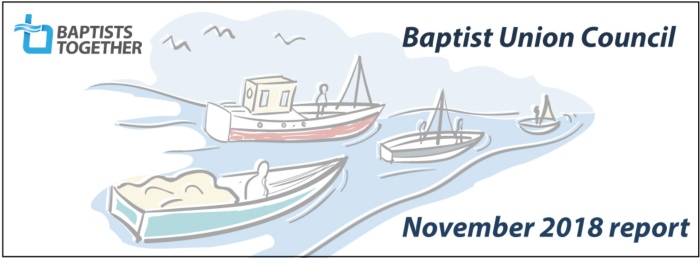
Scroll down for the following reports:
-
New Churches
-
Baptists Together Key Roles Nominations Team
-
Partnerships Review Process
-
Baptists Together Key Priorities – What is God’s call to us?
-
Children, Youth and Families Round Table
-
Subscriptions Working Group Report to Council
-
Finance update
-
Interim Report - National Settlement Review
-
Facebook live prayer event
Council took place at the Hayes Conference Centre in Swanwick on Tuesday and Wednesday (6-7 November). It began in scripture and worship. Beth Powney, team leader of the Eastern Baptist Association (EBA), read the Parable of the Persistent Widow, from Luke 18, twice. Worship was led by Mark Hirst (SEBA) and Molly Boot (SCBA).
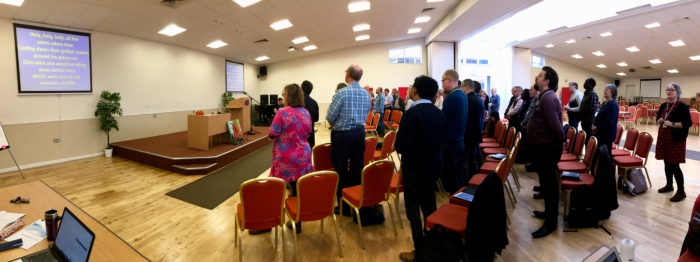
In response Lynn Green, our General Secretary, reminded everyone that the Lord is looking for a people who will say, “Blessed is He who comes in the name of the Lord.” She shared how Jonathan Oloyede, the convenor of the National Day of Prayer, had given her a prophetic word in 2017 about the Baptist family. 'In prayer, I saw the Baptist Family in the vanguard of an upsurge of faith and expressions of the Gospel of the Kingdom. It was remarkable and I believe that your denomination has the grace to help move the church forward in the Nation.' Lynn reflected, by God’s grace, He is at work in and through us not because we are somehow amazing, but it will be through our openness to Him and our willingness to welcome him and make space for Him.
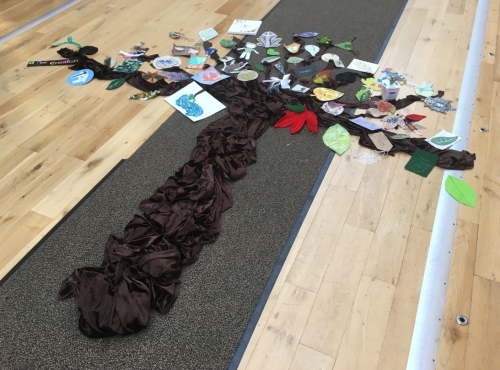 Council members were also introduced to a collaborative art installation organised by Gemma Dunning, minister of Leytonstone Baptist Church in London. Gemma described it as ‘an artistic exploration on the gender pay gap’, created during a period where we are celebrating so many anniversaries relating to women in ministry.
Council members were also introduced to a collaborative art installation organised by Gemma Dunning, minister of Leytonstone Baptist Church in London. Gemma described it as ‘an artistic exploration on the gender pay gap’, created during a period where we are celebrating so many anniversaries relating to women in ministry.
The installation featured 150 individually designed leaves arranged around a cloth tree. Each leaf represented a Baptist Together minister in the denomination, and had been designed by somebody other than that minister. Alongside Gemma had conducted a survey on ministerial pay in our denomination. Although the survey was small (71 responses), it had nevertheless revealed a gender pay gap. ‘Are we representative of Isaiah 61, do we represent the splendour in this passage?’ she said. ‘It suggests this is something we need to look at.’
Gemma encouraged each council member to take home a leaf and place it in a prominent place at home, as a representation of our wider family and a reminder to pray for one another.

New churches
Eight new churches which have joined our Union were welcomed, recognised and prayed for. Stephen Keyworth, Faith and Society Team Leader, introduced the churches, stating, ‘This is a good place to start. We recognise we are nothing without the mission and ministry of the local church.’
They are:
-
Church of the Resurrection (LEP), St Mellons, Cardiff (SWaBA)
-
Chapel and Schoolroom, Woodham Ferrers (EBA)
-
57 West, Southend (EBA)
-
Crondall Baptist Church (SEBA)
-
Milford Baptist Church (EMBA)
-
The Wave, Exmouth, (SWBA)
-
The Life Community, Axminster (SWBA)
-
Good News Brighton (SEBA)
Council was also told that Siloh Baptist Church, Tredegar, Blaenau Gwent, had resigned from our Union. It is already a member of the Baptist Union of Wales, and as a small church, wanted to simplify its membership.
Key Roles Nominations Team
Rupert Lazar, chair of the Key Roles Nominations Team, thanked Council members for working flexibly in the summer. This has resulted in some ‘significant’ appointments: a new moderator of trustees (Alastair Mitchell-Baker) and three new trustees (Paul Coleman, Mark Spriggs and Diane Watts).
Three of the four were present for their first Council. Alastair gave a brief introduction, explaining that he had spent the first half of his career in the NHS, and was now an organisational consultant. He has been an elder in his Baptist church (The Gate, Reading) for 16 years.
He said, ‘I’m really grateful for the confidence you’ve placed in me. I’m very much in listening mode, trying to understand this amazing family of Baptists Together.
‘There’s a real sense that God is moving; our church has been very impacted by prophetic words from Lynn. Everywhere we’ve been for The Turning, the backbone seems to be Baptist churches.’
He added there was something in our dna – about being bottom up, non-hierarchical – that others were now working to, adding, ‘I want to help the whole Baptist family have a Kingdom impact that is greater than the sum of the parts. I’m at the start of a journey, and am looking forward to it.’
Members also approved the nomination of Claude Halm (LBA) as the Council representative on the Baptist Steering Group.
Partnerships review
A discussion around Partnerships took place. Association Partnerships had emerged from the Futures Process as a means of encouraging more collaborative working, distributing Home Mission funding, and strengthening peer accountability between Associations, and between colleges.
They formed part of our governance arrangements in that the composition of the Baptist Steering Group (BSG) involved a representative of each Partnership.
'Five years on, where have we got to in terms of Partnerships?', asked David Mayne, Council moderator.
While it is recognised that much good has come from them, he said, they have operated on an informal basis and have not become a formal part of our structure. ‘What do we do in light of that?’
Council members were presented with feedback from Associations and Colleges involved in Partnerships, which captured how they had been working. A number of members involved in Partnerships also spoke about them. It was noted that while partnerships were informal, they were nevertheless both ‘highly intentional,’ and ‘highly missional’. They had enabled Associations to achieve more together than alone, and enabled a wider sharing of ideas.
David Mayne said there was ‘an awful lot of good things in there,’ and that there was ‘no intention of rolling partnership working back.’
In light of this feedback, and given that the composition of the Baptist Steering Group was established around Partnerships, a proposal was made and agreed that Council asks the Trustees to fulfil their role of reflecting and consulting about the future composition of BSG, bringing recommendations back to Council for discussion.
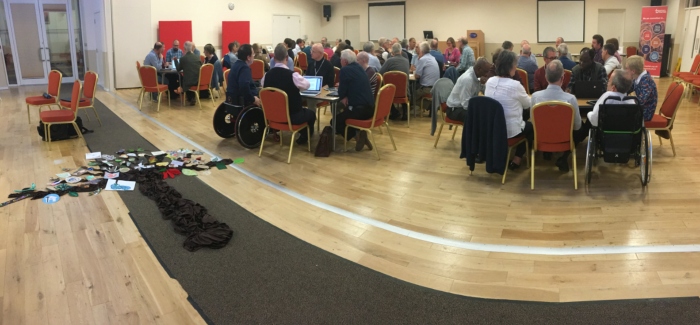
Baptists Together Key Priorities – what is God’s call to us?
Council spent a chunk of time on both days exploring our key priorities as Baptists Together over the next season, particularly in the light of the prophetic words we have been given from God about Him doing a new thing and breathing fire on His church and our response to that.
Lynn Green explained that back in 2014-15 Council engaged in a discernment exercise to identify key priorities and projects for 2015-2020 – and it had become clear that significant progress has been made in many of these areas. Many of these were key institutional challenges – including a strategy to stabilise the pension schemes; to complete and implement and the review of our safeguarding; to implement the ministries project (Ignite report) recommendations; develop a communications strategy and establish structures for relating that reflect our governance report.
Having worked hard to address some of our ‘urgent institutional’ challenges, she added, the time was right for a fresh discernment cycle where ‘we can now focus our efforts more directly on our vision for Kingdom mission.’
She reminded Council members of the context in which the discernment was taking place. Our overall vision is “Growing healthy churches in relationship for God’s mission”. This is shaped by our culture values: as we focus on making vision reality, Baptists Together are committed to intentionally developing a culture where we seek to be a movement of spirit led communities; feel like one team; embrace adventure; inspire others; and share hunger for God’s coming kingdom.
At the last gathering in March 2018, Council affirmed the four key areas of shared work across Baptists Together that deliver our vision: equipping the local church for mission; investing in Godly leaders; planting and pioneering; enabling Baptist voices and action in the public square. All this work is ongoing, Lynn said, ‘this is what Baptists Together does.’
This present discussion was about discerning shared priorities for us (Churches, Associations, Colleges and Specialist Teams) for the next season in response to the question “What is God’s call to us?” The Baptist Steering Group together with All Team Leaders have considered the question. The fruit of their thinking was captured in a paper offered to Council members.
The paper stated: ‘It does not mean that we won’t do anything else. Each church, Association, College and Specialist Team will continue to offer their own unique Kingdom contribution. Together we will also do many other things as well.
‘But we are trying to discern those things that MUST NOT be left undone and that deserve the collaborative and intentional focus of all of us. It is our belief that agreeing these key areas of focus will enable Baptists Together to have a Kingdom impact that is far greater than the mere sum of its parts.’
Council were subsequently asked: did these areas resonate? Was there anything that has been missed?
Following the discussions and feedback, a set of six priorities emerged.
They were:
-
Given the urgent need to pursue God’s mission in our UK context, we believe that we need to focus on our value: “Embrace adventure: Being serious about discipleship, willing to take risks, pioneer and move out of the comfort zone of familiar ways of doing things (Matt. 28:18-20) Council particularly wanted to embody this value in the context of mission, evangelism and discipleship.
-
Working through the remaining recommendations of the Ignite report
-
Developing leadership in all its forms, together with a focus on equipping the whole body of Christ
-
Children Young People and Families – our CYF Round Table brought some concrete proposals to Council in their presentation and these were affirmed (see below).
-
A similar but separate focus on Emerging Adults aged 18-35 – a group who are largely missing from our churches
-
Digital revolution – not only our own digital capacity, but reflecting on the implications of the digital revolution on mission, ministry and society.
When put to a vote, they were carried unanimously. The Baptist Steering Group will now explore how to unpack and implement these priorities.
Children, Young People and Families Round Table
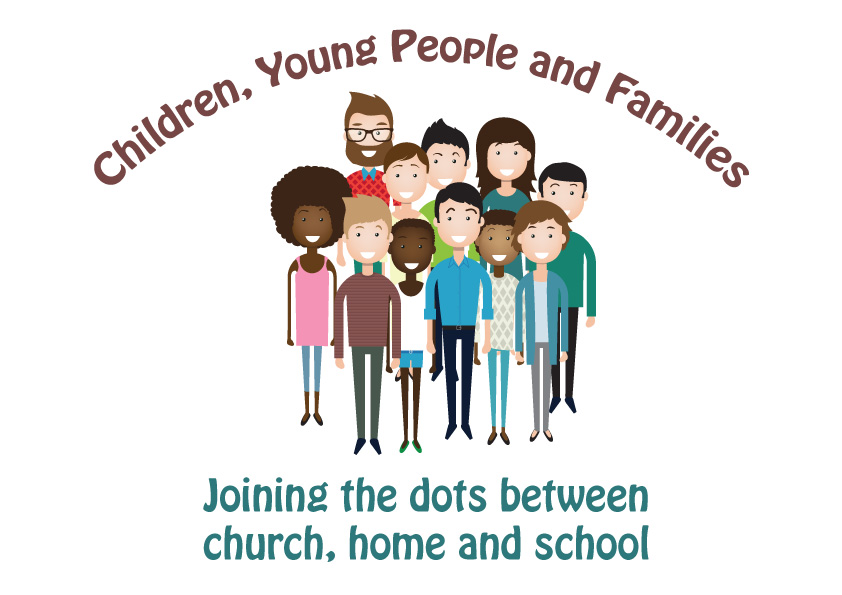 The CYF Round Table, which exists to ‘enable Baptists Together join the dots between church, home and community’, gave a presentation on Tuesday night.
The CYF Round Table, which exists to ‘enable Baptists Together join the dots between church, home and community’, gave a presentation on Tuesday night.
Amy Wearing, Minister for Youth at St Peter’s Baptist Church in Worcester, spoke of the importance of family, both our lived-in family and our church family, and highlighted how Jesus spoke about children: ‘We have a special responsibility to love them, and learn from them.’
She said CYF had been meeting for three years, spending time listening to practitioners; listening to what would be helpful. As a result, it had begun to recognise patterns and a gain an overview of current practice. It seemed that the traditional youth club and Sunday School was in general decline.
By contrast, however ‘the spirit of God is planting new things’, such as prayer spaces in schools, more mentoring opportunities and new ‘messy’ congregations.
‘Is this what we’ve been praying for?’ she asked. ‘How can we join in with God?’
‘We need courage as Baptists to go to these new places and release people.’
Around tables facilitated by Council member and CYF rep Jodie Thorpe (YBA), Council members were invited to consider what was working well in their areas, and what seemed to be in decline. The CYF received this feedback.
Following these discussions, Mike Lowe, Baptists Together Communications Enabler who is part of the CYF, offered a number of measurable challenges, each in relation to the four areas where we work. These were:
-
Pioneering and Planting – An intentional nurturing of new expressions of church/multi-congregations with CYF at their heart, for example Messy Church, Forest Church with the aim of at least one new initiative per year in each Association.
-
Investing in Godly Leadership – To have the voice of CYF in every strategic decision-making group of national, association and college life.
-
Equipping Churches for Mission – For all Specialist Teams, Associations and Colleges to incorporate in their strategic planning the equipping of CYF ministries and mission.
-
Voice in the public square – To establish an informed voice in the public square specifically into education (including schools, higher and further education) that represents and impacts local churches, communities and their families.
Another member of the CYF Clare Hooper, a regional minister the Southern Counties Baptist Association, stressed ‘We want to work with all the Baptist family,’ before adding: ‘The majority of churches play it safe in their ministry with children and young people; working mainly with those already in church and failing to connect with those outside. We need to be a community that takes more risks.’
For more on the Children, Young People and Families Round Table, visit: baptist.org.uk/cyf
Subscriptions Working Group Report
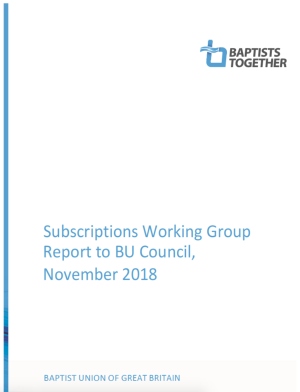 The desire for sustainable funding for mission has led us to explore fundamentally changing how we are funded as Baptists Together and proposals in this area was considered during three sessions of the latest Council gathering.
The desire for sustainable funding for mission has led us to explore fundamentally changing how we are funded as Baptists Together and proposals in this area was considered during three sessions of the latest Council gathering.
Council members received and discussed a report brought by the Subscriptions Working Group, which had been set up at the beginning of the year following a discussion at last November’s Council. The group’s remit was to look at whether increasing subscriptions to cover the actual costs of enabling mission through the practical support and administration offered by Regional Associations and the Specialist Teams was an appropriate way forward, in order to bring a greater clarity to the way money is raised and used, enabling a clearer focus on releasing funds for direct mission initiatives.
Presenting the report, Richard Wilson, Support Services team leader, said there was ‘a complex balance of different dynamics’ at hand.
The current funding model is widely misunderstood, in that there is a perception that the present subscription pays for the structure of Baptists Together. This is not the case: while subscriptions are a useful source of income (£0.5m), our key funding comes the Home Mission appeal (£3.9m) funds both both mission initiatives and also contributes to enabling mission regionally and nationally through the Associations and the Specialist Teams.
In addition, there are risks to the sustainability of the current model. Richard noted that Home Mission is in steady long-term decline when allowing for inflation. However, we are not in crisis, and now is therefore a good time to explore the best way to fund our activities.
The proposal at hand was about ‘rebalancing’: raising the subscription level to a rate that pays for the operational costs of enabling mission through our Specialist Teams and Associations; alongside a separate Home Mission stream of voluntary contributions for front-line mission activity.
Richard said that a church such as his – a mid-sized Baptist church in Reading – would be expected to contribute the same overall as it does now, but the balance between Home Mission and subscription would change from around £3,000 Home Mission and £250 subscription to £2,200 in subscription and £1,050 in Home Mission. The key impact would be on the minority of churches that currently pay their subscription but make little or no contribution to Home Mission. The report also stressed that subscription may not be the best language to use: the preferred term suggested was “Family Contribution.”
The report highlighted a range of pros and cons, which Council members were able to consider at length.
One advantage in significantly raising the subscription level to such a rate would be ‘to give greater clarity to churches on where the money goes’. In addition, it was hoped that by releasing voluntary funds purely for front-line mission activity would result in the overall level of giving increasing.
Among the potential issues, the report recognised that the theology of subscriptions is complex, and that some will find the proposal difficult on principle.
Council members participated in small group discussions on both days to consider specific aspects of the proposals, and a plenary discussion took place on Wednesday. Members were also invited to share feedback on flip charts dotted about the room.
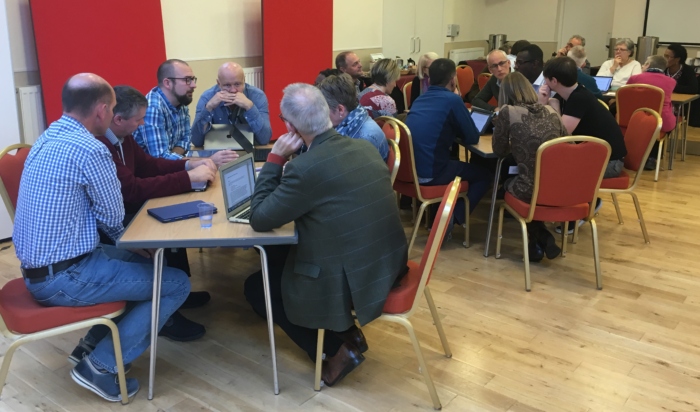
The proposal received a mixed reception. There was concern about the timing, particularly with many churches still paying substantial pension deficit contributions. There was concern about moving to a contractual rather than covenantal relationship; and the view was expressed that this was not in keeping with our ecclesiology.
There was a general consensus that greater clarity is needed so churches could better understand how the funds are used for and could catch a vision of what could be achieved. With much talk about relationships, and their potential fragility, there was talk of a need to deepen our understanding of what it means to be in a covenantal relationship.
It was noted that the members of Council under 40 generally supported moving forward with the proposal and saw subscriptions as a way of demonstrating clear commitment to our covenant together and valuing the support delivered by Specialist Teams and Regional Associations.
There was some support expressed for a funding model centred on Regional Associations rather than a national Home Mission fund. It was noted that there would be substantial variations in the subscription rate if a subscription was levied by each Regional Association, which was why this option had been rejected by the Subscriptions Working Group.
In the final session on this topic Council members were presented with three different ways ahead; to move forward and initiate a consultation process across Baptists Together; request changes and ask the Subscriptions works group to consider the input and present amended proposals to a future BU Council; or to reject the proposals and continue the current system.
Just 13 members of Council favoured moving forward to a consultation process. Council asked the Baptist Steering Group, together with All Team Leaders, for further reflection and discernment about the way forward, including further consideration of alternative options, such as a Regional Association based model.
Huge thanks were expressed to Richard Wilson and the working Group for all their hard work and for providing such an excellent report.
Finance update
A finance update was shared. Our income is tracking in line with budget, explained Richard Wilson, Support Services Team Leader. However, Home Mission is approximately £100k behind budget at this stage, while legacy income is around £100k ahead.
He said, ‘We’re doing ok. God is good to us – He has provided what we need. But we need to be aware that Home Mission continues its gradual decline.’
John Levick, our Union’s treasurer, said there was good news relating to the pensions situation. The overall deficit is now in the just below £80m (it had peaked at £146m). This was before the Family Solution, where we will aim to reduce the deficit by a further £30m. When this happens the deficit will be below £50m, hopefully in the low 40s. ‘That’s where we are going,’ John said. ‘But as always, the situation is complex.’
National Settlement Review
Council members were asked to share their views over options being considered for the settlement system for ministers and churches. The Ignite report looking into the future of ministry, published in December 2015, recommended that a review of the National Settlement Team (NST) was undertaken within two years. The NST had been created in 2002, following on from the Superintendent’s Board which originated in the early part of the previous century.
Andy Hughes, Ministries Team Leader, explained there were two options being considered.
-
The National Settlement Team continue to meet as before with some incremental changes to aid the discernment process.
-
A new system is developed enabling Ministers to apply directly to churches in vacancy, with the Regional Teams assisting churches and ministers in the discernment process.
A survey was undertaken at the end of last year of all the churches, ministers and students who had been in settlement in the previous three years before August 2017. The survey revealed that 65 per cent of churches would recommend the present system, while the same proportion would welcome a system where ministers could apply direct. 68 per cent of ministers would recommend the present system, with 18 per cent saying they would not recommend it to others.
The survey provided space for additional comments to be made and a wide range of comments were made both by churches and ministers. While it’s clear that many have had a good experience, and value the input of the settlement team, the report stated, ‘this is certainly not true for all.’
There are a number of common themes which recur through the feedback, such as: the process is slow and laborious, often the ministers that churches want to speak to are already in conversation with someone else, and that churches are frustrated to receive names from ministers who clearly don’t want to come to them.
Likewise, ministers made similar comments about the fact that the process can be slow and laborious, that their name goes to unsuitable churches (geography, profile etc). A number of women commented that their name went to churches who wouldn’t consider a woman, which they found hurtful.
Following the survey all the RMTLs were provided with a complete set of all the responses, and it had been discussed at an NST meeting.
A working group has been established to enable changes to be explored. One of the major frustrations expressed by both churches and ministers is that nominations are made by NST and the immediate response from the minister is that it is not a suitable situation for them. This means that the church and minister then have to wait for the next meeting. It was agreed that the Ministries Team would put the Pastoral Vacancy List (PVL) on the website and make it available to all accredited ministers and students. There has been much interest since it went live.
The working group has been considering three potential models ranging from a recruitment model, through to direct nomination by ministers. The recruitment model where one individual would be aware of all the vacancies and all those seeking settlement and then make introductions to churches has been ruled out as it does not fit with our ecclesiology. This leaves either the present process with some improvements, or a process where vacancies are available to view online, and ministers are then able to apply directly.
The online process would remove the need for the NST to meet, as ministers would make contact directly with churches. The Regional Ministers would still be involved in the process, including agreeing that the profile submitted by a minister or church gave an accurate representation of them.
The online system will have potential savings in cost and in time of key members of the Association staff, though more detailed analysis will need to be done as part of the review.
Council members expressed a variety of views. There was recognition of the valuable role regional ministers play in the process, and testimony of how they system had worked well. Some felt opening up the system could lead to issues, including a sense of individualism and creating a situation ‘where ministry is a job’.
However, the assumption that advertising somehow took away this sense of call was challenged on a number of occasions. Other members spoke of how the system could be long and slow. A question about whether there could be elements of both approaches was asked.
The next step will be to assess the experience of having the on-line PVL available to ministers and asking them to provide nominations to their Regional Minister, and to develop a more detailed proposal for the direct contact approach.
Facebook live prayer event
For the third successive Council, an evening prayer session was streamed live on Facebook. This time it had a Children Young People and Families focus, and was led by members of the CYF Round Table. Our current President Dave Gregory, who edited the resource
Messy Church Does Science, also led a section by creating his own wave machine in a bottle: the session can be viewed below.
Baptist Times, 13/11/2018